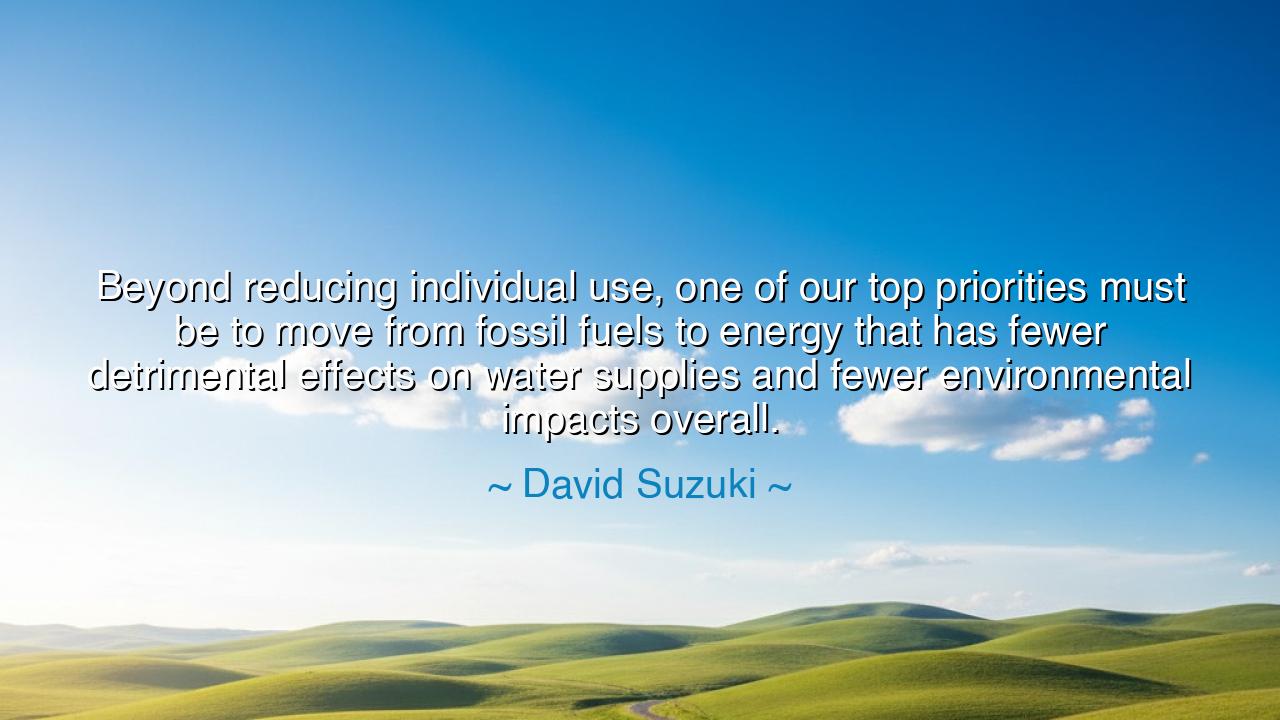
Beyond reducing individual use, one of our top priorities must be
Beyond reducing individual use, one of our top priorities must be to move from fossil fuels to energy that has fewer detrimental effects on water supplies and fewer environmental impacts overall.






The words of David Suzuki, “Beyond reducing individual use, one of our top priorities must be to move from fossil fuels to energy that has fewer detrimental effects on water supplies and fewer environmental impacts overall,” sound like a trumpet call across the ages. They remind us that small actions, though noble, cannot alone bear the weight of the world’s survival. The task is greater: to transform the very foundations of how we power our lives, to cast aside the burning of ancient carbon, and to embrace new forms of energy that honor the water, the air, and the land. In these words lies not only urgency but a vision of renewal, of humanity choosing wisdom over destruction.
The origin of this saying is rooted in the voice of a man who has long stood as a guardian of nature. Suzuki, scientist and seer, looked upon the earth not with the eyes of commerce but with the eyes of reverence. He saw that every river, every forest, every breath of air is bound together in one web of life. And he also saw that the burning of fossil fuels, though it brought wealth and comfort, was unraveling this web, pouring poison into streams, heat into skies, and despair into the hearts of future generations. His words carry the weight of one who has spent a lifetime warning against humanity’s reckless path.
To understand the depth of his cry, recall the story of the Aral Sea. Once among the largest inland bodies of water, it was fed by rivers diverted to fuel unsustainable industry and powered by systems reliant on fossil-driven expansion. The result was catastrophe: the sea shrank, its waters turned toxic, and fishing communities collapsed into ruin. Here we see the truth Suzuki warns of: that energy practices with “detrimental effects on water supplies” do not merely harm nature, but unravel entire human societies. What was once a sea of life became a graveyard of dust and despair.
Suzuki’s words also hold a heroic charge: that humanity must not settle for small gestures alone. To reduce individual use is noble, yet insufficient. True transformation demands that nations, corporations, and communities rise together to abandon the chains of oil and coal, and embrace the winds, the sun, the flowing waters, and the deep heat of the earth. This is not weakness, but the bold strength of a people choosing to endure. For what is more heroic than refusing to leave behind a world in ashes for one’s children?
Yet let us be clear: to move beyond fossil fuels is not merely a technical challenge; it is a spiritual one. It asks us to break habits of greed, to look beyond short-term profit, and to recognize that prosperity must be measured not in riches alone, but in clean rivers, fertile soils, and skies free of poison. Suzuki teaches that the earth is not ours to consume, but ours to safeguard. To ignore this is to invite collapse; to honor it is to ensure survival.
The lesson is bright and unmistakable: do not be content with personal gestures alone, though they are good. Press your leaders, your companies, your communities to embrace clean energy. Demand policies that protect water and air. Support innovation that values life over wealth. And in your daily life, choose renewable sources when possible, walk and ride when you might drive, and treasure each drop of water as though it were the blood of the earth itself—for indeed, it is.
Therefore, let us live as guardians, not merely as consumers. Let each home become a place of conservation, and each voice become a call for transformation. The ancients knew that rivers were sacred, that the sun and wind were gifts. Now, in this age of peril, we must remember what they knew, and marry it with the science and tools of our own time.
So let Suzuki’s words echo as a teaching: “One of our top priorities must be to move from fossil fuels…” This is not merely advice—it is prophecy. If we heed it, the world may flourish anew. If we ignore it, the rivers will dry, the seas will rise, and the future will crumble. Let us choose, then, the path of courage and wisdom, so that generations yet unborn may drink clean waters, breathe pure air, and walk upon a living earth.






AAdministratorAdministrator
Welcome, honored guests. Please leave a comment, we will respond soon